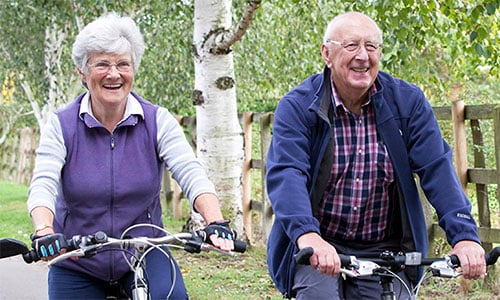This year marks the 10th anniversary of our first annual report about the state of health and care of older people in England.
In 2015, we set out to examine how well the health and social care system was meeting the needs of older people. At the time, the system was not yet equipped to accommodate the needs of the UK’s rapidly ageing population. The hope was that, over the years, this would improve, as the Government and other policy makers adapted the system accordingly.
Ten years on, our new report reveals that while more of us are living longer, on many other measures we have gone backwards. Fewer people are getting long-term social care support, fewer key health staff are working in the community, and perhaps worst of all, we are living fewer years in good health.
Here are our 5 key takeaways about the state of health and care of older people in England in 2025:
1. Healthy life expectancy at age 50 and at age 65 in England has declined.
Healthy life expectancy is defined as the number of years a person is expected to live without disability or long-term health conditions.
In the past ten years, male and female health life expectancy has declined, reducing from 19.9 to 19.4 years in men aged 50-54, and from 21.1 years to 20.6 years for women of the same age.
It’s a pattern that bears out for men and women aged 65-69 too. This means that on average we can expect to live a greater proportion of our final years in poorer health.
2. The likelihood of living with multiple health conditions significantly increases with age.
Multimorbidity means living with two or more long-term conditions such as diabetes, arthritis, and heart disease.
Our report reveals that 1 in 5 people in their 50s have multiple long-term health conditions, and the likelihood of living with multimorbidity only increases with age.
2 in 3 (68%) people aged over 80 are living with two or more long-term health conditions.
This underpins why access to good health and care services is so vital to living well in later life.
3. Fewer older people are receiving local authority long-term care.
Despite the decline in healthy life expectancy and the prevalence of long-term health conditions in later life, fewer older people are receiving care from their local councils.
Although the total number of older people receiving care from their local council has slowly increased in the last two years, the current number is still more than 28,000 lower compared to ten years ago.
This is especially remarkable considering that there's been a significant increase in the number of people aged over 75 living in the UK, who are one of the most likely groups to need support.
4. The number of District Nurses has declined by 19%.
District Nurses play a crucial role in supporting older people at home, whether recovering from an illness or managing long-term health needs.
However, they are one of several key job roles to decline in recent years, reducing by 19% in the decade since our first briefing.
This may play a part in why the numbers of older people being admitted to hospital for avoidable reasons is going up.
5. The number of vacancies for some key adult social care roles has increased.
The lack of staff in the community is even more apparent in social care.
On average, there were 131,000 vacant social care posts in 2023/24. Between 2012 and 2024, the vacancy rate for adult domiciliary care roles (social care delivered in people’s homes) almost doubled to 11.6%.
This is having a huge impact – in our 2024 State of Health and Care report, we estimated that there are two million older people with unmet social care needs.
Looking ahead
Ten years ago, in the conclusion of our 2015 State of Health and Care report, we said:
“Unless there is significant change to the funding of our health and care system for older people as a result of decisions taken in the Government’s Spending Review, we look to the future with considerable foreboding.”
It is difficult to conclude any differently today, despite the incredible efforts and compassion of staff across the NHS and social care.
With the Government embarking on its own 10 Year Health Plan and with the promise of the Casey Commission – an independent commission the future of adult social care – on the horizon, this is a critical moment for improving the care of older people and we urge the Government and other policy makers to act decisively.
The State of Health and Care of Older People in England 2025
Our latest analysis of the health and social care needs of the older population, and recommendations for the NHS and social care.






